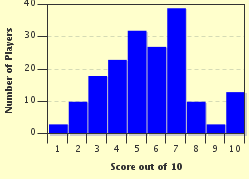Quiz Answer Key and Fun Facts
1. The first slogan posters were produced in 1939, and intended to prepare folk in case of a disaster. The first two to be produced were "Freedom Is In Peril. Defend It With All Your Might" and "Your Courage, Your Cheerfulness, Your Resolution Will Bring Us Victory". The third did not have as wide a distribution, do you know which?
2. One of slogans was created in 1940 and replaced the slogan "Do not discuss anything which might be of national importance. The consequence of any such indiscretion may be the loss of many lives." Do you recognize the new slogan from those listed?
3. When the war seemed imminent, it was believed that children, mothers of small children, and pregnant women should be evacuated. Which of these slogans was used to convince folk to send the children to safety?
4. There were several slogans to remind folk to recycle and not squander valuable resources such as kitchen scraps. Which one of these slogans was NOT used to remind people to recycle?
5. In September 1939 a blackout was instituted in Britain. Blackout material was distributed to each household and needed to be hung at doors and windows. Street lights went off. The number of accidents increased exponentially. Which slogan was used to remind folk to be more careful during blackout?
6. As men were enlisted and preparing to fight, one concern was the possibility that Britain would be invaded. An appeal was made for men not already serving to volunteer for for the Local Defence Volunteers, later known as the Home Guard. Which of these slogans was used for the Home Guard?
7. The Women's Land Army had been formed during World War I, but was reformed in 1939. With the able-bodied men at war, women were needed to plant and harvest food, as well as care for cows, chickens and pigs. Which of these slogans were used to recruit volunteers?
8. During World War I, people had seen the damage of gas warfare, and so soldiers and civilians were issued gas masks to carry with them at all times. What slogan was used as a reminder?
9. It was important that people stay healthy and continue to work. Which of these slogans was used to help with this effort?
10. In 1939 a campaign was started to encourage everyone to grow a garden of food. Which of these campaigns announced "We want not only the big man with the plough but the little man with the spade to get busy this autumn..."
Source: Author
mlcmlc
This quiz was reviewed by FunTrivia editor
bloomsby before going online.
Any errors found in FunTrivia content are routinely corrected through our feedback system.

